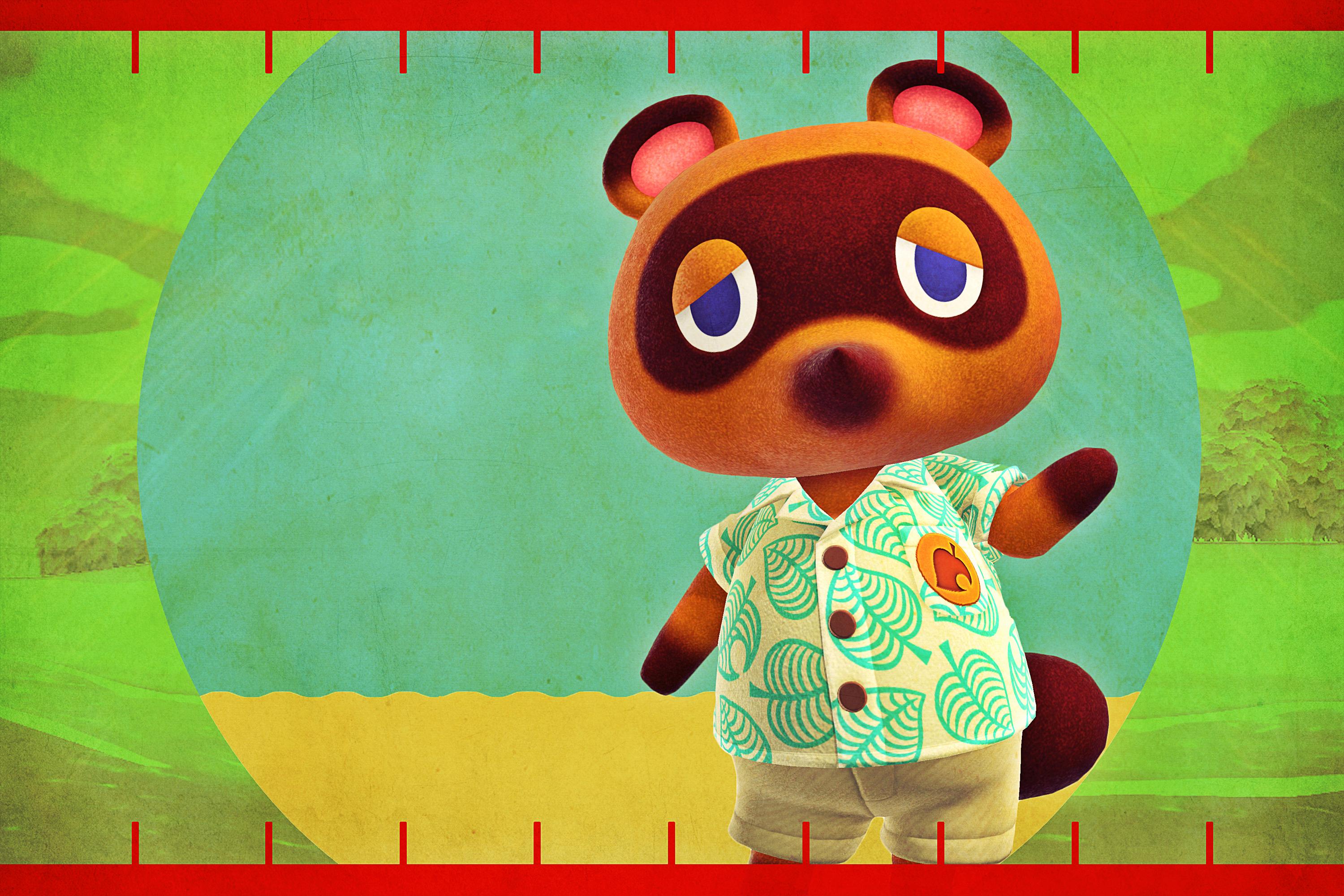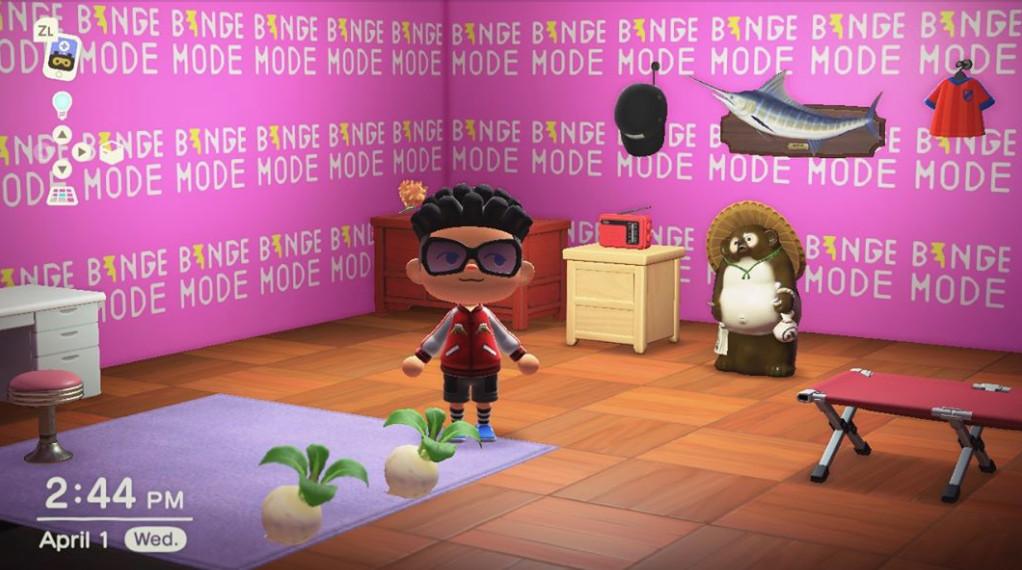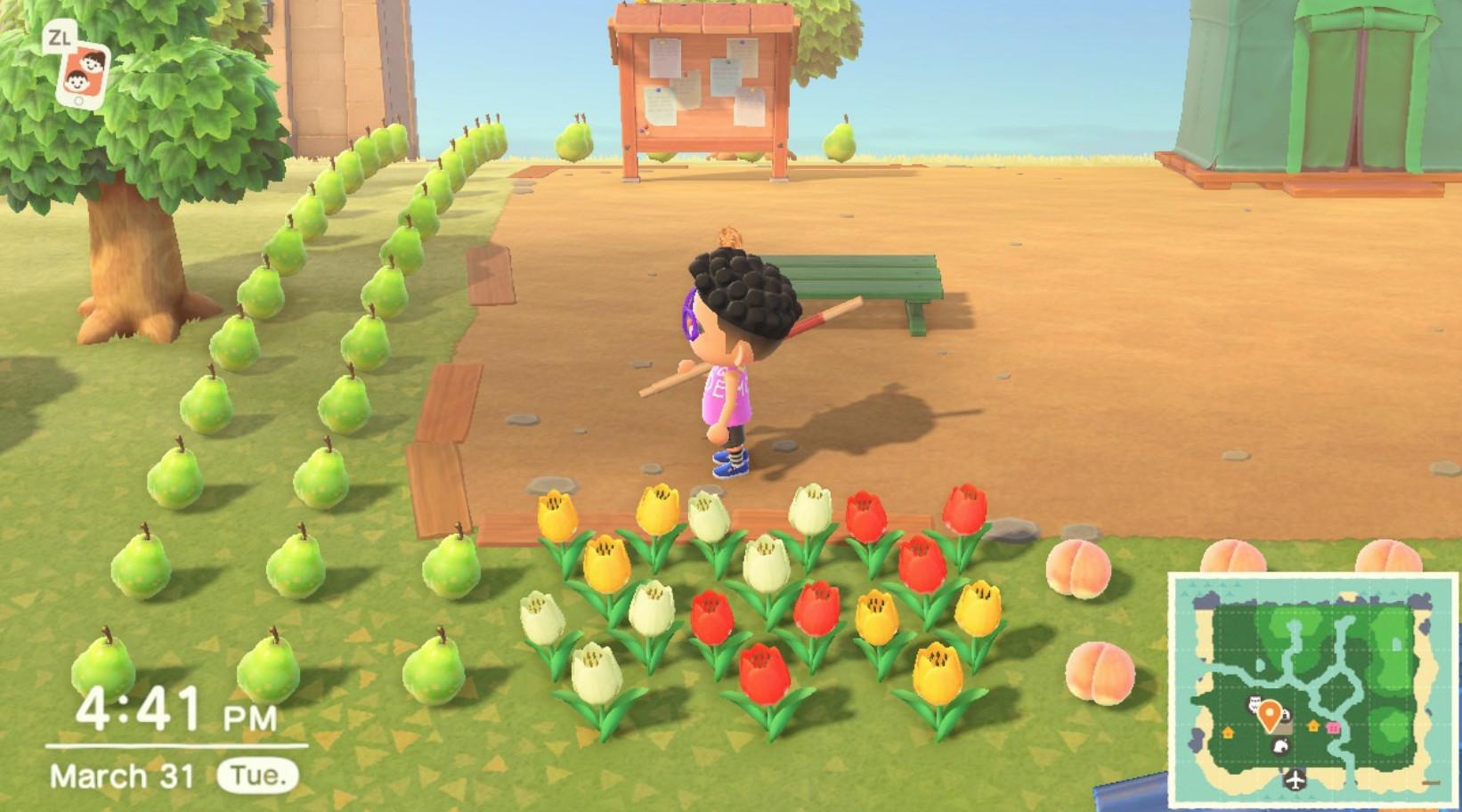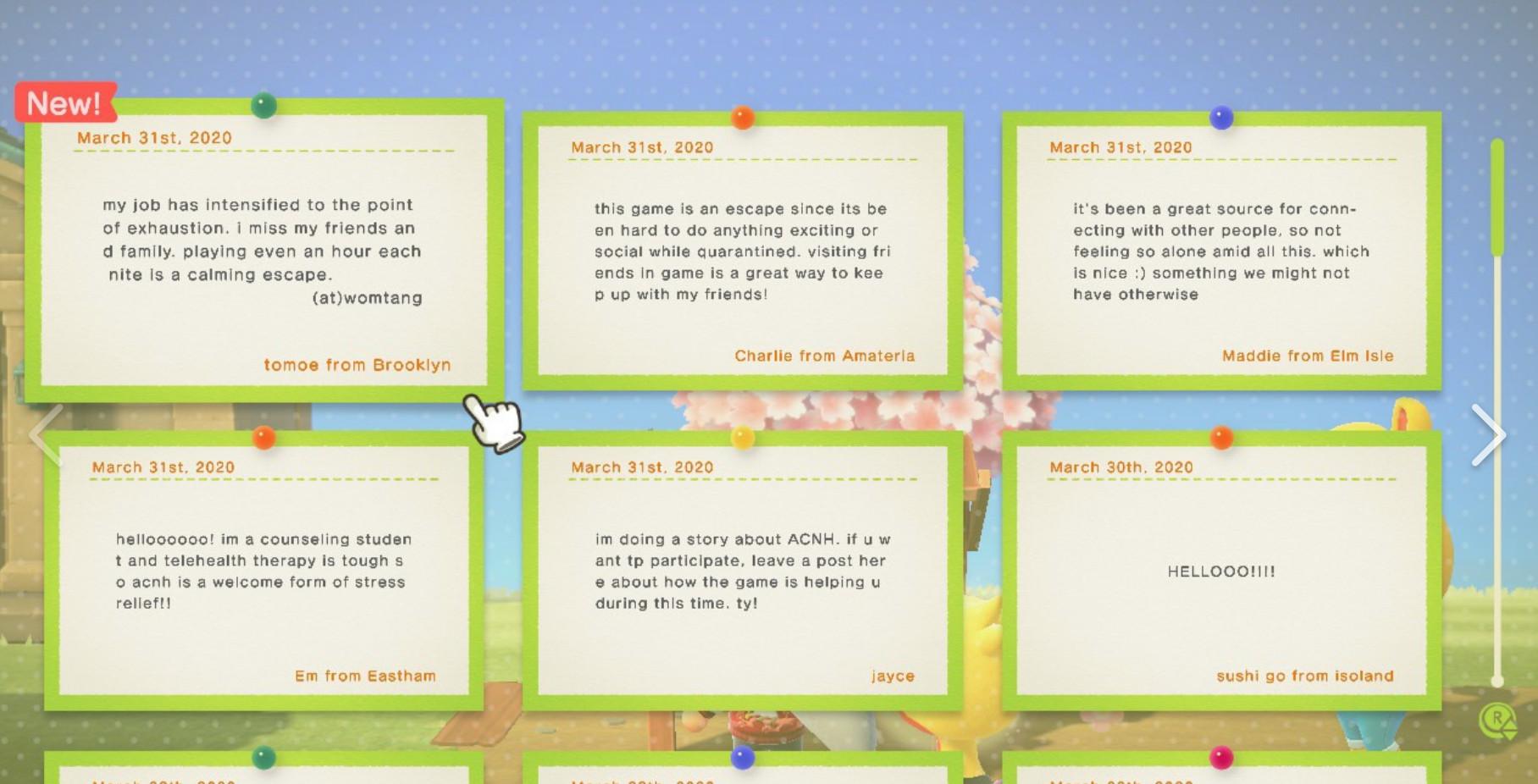Social Distancing Diaries: Escaping Into the Soothing Grind of ‘Animal Crossing’
The charming game that is supposed to simulate life is a perfect fit for the COVID-19 pandemic—even if Tom Nook runs his island like a mafia boss
The sports and pop culture calendars have paused. The safest thing that you can do right now is stay inside. And millions of people are looking for creative ways to pass the time. The Ringer is here to help. We’re starting a series called the Social Distancing Diaries, with our staff’s ideas for finding comfort, joy, community, or distraction while doing your part to flatten the curve. In the coming weeks, we’ll be diving into what we’re passionate about and want others to discover—from bidets to buried treasure and everything in between.
My days, for the last week or so, begin like this. I wake up. I think Ah, yes, that’s right, everything is terrible. I grimly scroll through the latest terrible news. I take a deep breath. I pick up my Nintendo Switch and boot up Animal Crossing: New Horizons and travel to Brunchcake, my bucolic island. Well, it’s not quite my island. As with every iteration of Animal Crossing, the real estate is owned by Tom Nook, a cheerful raccoon. After Tom’s daily briefing, typically a lightweight affair about special events and turnip prices that he delivers while in his pajamas, I get into my routine. I traverse the island, crossing rivers and climbing hills. I shake trees to collect fruit, stray branches, the occasional coin—while riling up the not-occasional-enough wasp nest. I wallop rocks with my ax in search of ores and stone. I gather weeds and capture all manner of bugs. I dig for fossils, many of which I donate to the museum. I go fishing. I chat with my fellow residents. All is depicted in the familiar Nintendo house style: vibrant colors, rounded lines, and pleasant, wide-eyed characters. When I can carry no more, I visit Nook’s Cranny, the island’s general store, to exchange my items for bells, Animal Crossing’s fictional currency, which I need to purchase luxury goods and pay off my steadily ballooning mortgage. At the time of this writing, I owe that rascal Tom Nook 182,498 bells, a relatively low figure among Animal Crossing players. Being six figures underwater has never been so relaxing. Maybe later I’ll have some friends over to visit.
Animal Crossing: New Horizons is the fifth title in Katsuya Eguchi’s series, which began in 2001 with Animal Crossing, released for the Nintendo GameCube. That was followed in 2005 by Animal Crossing: Wide World for the Nintendo DS (I fondly recall playing Wide World during my F train commute between Brooklyn and Manhattan, time melting away), 2008’s Animal Crossing: City Folk for the Nintendo Wii, and finally 2012’s Animal Crossing: New Leaf for the Nintendo 3DS.
Nintendo categorizes Animal Crossing: New Horizons as a “simulation.” Which is perhaps not how the many fans of the series think of it. There are essentially two kinds of simulation games: those that hue strictly to realism, sometimes for training purposes—flight simulators, for instance—and those that allow the player to be a god-level manager, like The Sims or Railroad Tycoon. Both put the player in control of events.
Animal Crossing: New Horizons takes a different approach. It simulates life. Which is to say, it simulates a system of economic forces and cultural values that we accept as normal. In the game, as in real life, the player is beholden to these processes that exist beyond anyone’s control. Even time, usually a malleable dimension in a video game world, is explicitly lifelike. Animal Crossing’s clock moves according to the real-world clock and calendar. When it’s 9:30 a.m. on Thursday, April 2, in the increasingly terrifying real world, it’s 9:30 a.m. on Thursday, April 2, in Animal Crossing. Private property, the dominance of capital, wage labor, frequent-flyer miles programs, online shopping, the heedless exploitation of natural resources, the stock market, banking, apps, smartphones, instant messaging—all these things exist in Animal Crossing. In life, these forces can be paralyzing in the best of times. Yet Animal Crossing renders them as satisfyingly soothing and escapist. The game accomplishes this by filing down life’s sharp edges, its fangs and claws, to harmless nubs, virtually transforming it into a cutesy, sometimes annoying, little pet.
For example, I was living in a tent in the days following my arrival on Brunchcake. Tom informed me that before discussing a more permanent living arrangement, I would have to pay him the 5,000 Nook Miles owed to him for travel costs and moving fees. Nook Miles are the proprietary currency of Nook Inc.’s rewards program. The program, like a credit card points system, incentivizes certain activities by rewarding the consumer with Nook Miles (NM) for their completion. There are daily challenges—plant a tree, receive 100NM; chop down a tree, receive 200NM; and so on—and persistent multilevel challenges that require a certain number of steps to complete. The “Good Things in Store” challenge has five levels. Completed levels get stamped, and each level awards a certain amount of NM.
Now, not only did Tom Nook transport me to a distant island without fully informing me of the details of our socioeconomic relationship—which amounts, I should add, to indentured servitude—but part of the way I pay him back is by exchanging my labor for Nook’s proprietary currency via the Nook Miles+ app on the Nook Inc. Nook phone that I carry everywhere I go. Moreover, Nook’s Cranny is run by Tom’s sons, Timmy and Tommy. Nook Inc. is essentially a mafia family.
And yet the constant grind is soothing because it is so easily achievable. Bells and Miles are easy to come by. Practically everything on the island can be harvested and sold for cash. A single clump of weeds, which grow everywhere on Brunchcake, can be exchanged for 10 bells. Selling them earns Nook Miles via the “Greedy Weeder” challenge. Fish, insects, fruits, and seashells can all be sold for currency and all are plentiful. Concerned about the environment? Don’t be. Resources respawn. Anyway, the island’s natural beauty will dissuade you from clear-cutting the trees and filling the landscape with unsightly holes. If you do ever get the itch to deforest a landscape, cash in some miles for a plane ticket to a randomly generated island and hack away to your heart’s delight. Fly away with the resources and let some other dummy clean up the mess.
Another way to make money is to play the turnip market, Animal Crossing’s version of the stock market. Every Sunday, a babushka-clad pig named Daisy Mae, the granddaughter of a character from previous games, arrives on the island carrying a basket of turnips on her head. I purchased 200 turnips from Daisy at 94 bells a pop. Starting the following Monday, turnips can be resold at Nook’s Cranny. The resale price changes twice a day, in the morning and afternoon. At the time of this writing, turnip prices were at 58 bells. I might take a bath on this deal and I couldn’t care less.
Injury, illness, and death aren’t a concern in the game either. Getting stung by wasps is the worst that’s happened to me. My character’s face swells up and other characters in the game might make a comment. But injury doesn’t hinder gameplay at all. And medicine is easily obtained—simply pick some weeds and combine it with the wasp nest and voilà.
The goal for Animal Crossing players is familiar and simple: level up your house and buy nice stuff to put inside of it. My house is rudimentary at the moment. But I’ve got a funky ice cream cone lamp, a nice dresser, a statue of a raccoon, and a stuffed Marlin on the wall, among other items. But buying nice things is useless unless you can show them off. And it’s Animal Crossing’s interactivity that really makes the game feel necessary at this awful moment in time.

As much of the country and the world endures fear and isolation, Animal Crossing players are free to visit their friends. Players can communicate via their Nook Phone’s messaging app. Many exchange gifts. Some recent guests on Brunchcake started an impromptu jam session, an utterly charming bright spot in my day, despite one of the visitor’s Nets gear.
Later, a misunderstanding led to a visitor absconding with my raccoon statue, a present from another guest. This was quickly returned. Generally, I’ve been literally overwhelmed by the generosity of my guests, who inundate me with fruits, flowers, and weird household items.

Visitors can leave messages on the bulletin board in the town square and exchange goods. I asked some of my recent guests how the game is helping them cope with the fear and isolation wrought by the COVID-19 crisis.

“My job has intensified to the point of exhaustion,” wrote tomoe from Brooklyn. “I miss my friends and family. Playing even an hour each night is a calming escape.”
Maddie wrote “It’s been a great source for connecting with other people. So not feeling alone amid all this … which is nice. Something we might not have otherwise.”
Lately I’ve been wondering how our country will respond to the pandemic once the immediate danger has passed. There’s never been a better time, it seems to me, to make sure people can be secure in their health and protected from the worst parts of our economic system. Animal Crossing’s cuddly version of capitalism suggests that even at play, unleashed from reality, we struggle to imagine something different, something better.
The other night, unable to sleep, I picked up my Switch and began to play. I received a message from the game telling me that if I happened to see a falling star, I could make a wish by pressing A to make a wish. I didn’t see one, but I stared at the sky for a long time.